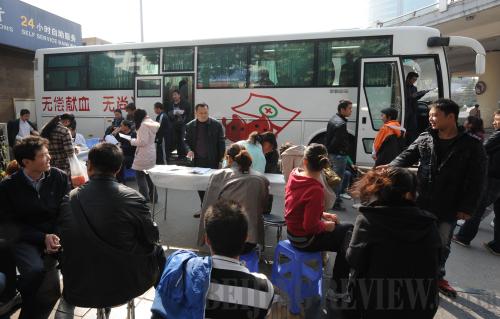|
 |
|
RAPID RESPONSE: Residents in Zhengzhou, Henan Province, donate blood on October 29 after the city reported blood shortages (XINHUA) |
Blood Crisis
Many cities in China have recently reported blood shortages. There is a belief the public's excessive concerns about possible side effects of giving blood, ineffective incentives and a weak blood security network should be blamed.
But statistics from the Blood Center of Kunming in southwest China's Yunnan Province reveal government employees and medical workers account for only 0.92 percent and 1.2 percent of blood donors in the city, while college students and migrant workers make up 90 percent. If this is common in most Chinese cities, blood insufficiency is almost inevitable, because the blood donation system needs support from the whole of society, not only a small fraction of the population.
Civil servants enjoy stable jobs and incomes and their higher social status ensures them a greater share of social resources than college students, migrant workers and other groups. All these make it necessary for them to be major blood donors and set an example of undertaking full social responsibility.
The recent blood shortages basically resulted from people's disbelief in the donation system. If 90 percent of the donors are civil servants and other public sector workers, and there is a transparent blood donation and supply, surely more people will join in this form of almsgiving.
Qilu Evening News
News Stands
Nanjing, capital city of Jiangsu Province, began the removal of news kiosks along major streets last year. The number has dropped from nearly 1,000 to around 500. Relevant departments say the news kiosks are unlicensed and spoil the city's look.
This is a self-contradictory excuse, because without the permission of the urban planning authorities, the setting up of these news kiosks along major streets is impossible. The real reason is not illegality, but some officials believe they are "negative" to Nanjing's image.
The most important components of cities are not skyscrapers or shiny, luxurious cars running on broad streets, but the people living there. Take the news kiosks in Nanjing for example. They are not only income sources for their operators, but make cultural life easier in the neighborhood. If a modern city can't even put up with small news kiosks, its modernization is questionable.
The theme of the recently concluded World Expo in Shanghai is Better City, Better Life. A really impressive city is one providing its dwellers with comfortable and convenient life.
Xinmin Evening News
Even More Unfair
Recently, the General Office of the Standing Committee of the National People's Congress, China's top legislature, published the draft law on vehicle and vessel use taxation for public feedback. Regulations involving tax exemptions for government, police and military vehicles have incurred criticism. The tax is levied to encourage energy-efficient vehicles. If publicly funded vehicles are exempted from this tax, does it mean these privileged vehicles do not consume energy and do not emit exhaust?
It's widely known even if publicly funded vehicles are legally bound to paying taxes, the users are still able to cover them with the government's budget, but never take money from their own pockets. Despite this, at least the public has the legal support to supervise the use of publicly funded vehicles. But if the tax is cancelled for these cars, supervision is more difficult. Privileged car users can unscrupulously choose high-emissions cars, as they don't have to pay tax.
Anyone, whether they are ordinary people or government officials, needs to pay for his or her consumption of energy. The proposed tax exemption for publicly funded vehicles, however, does encourage unscrupulous vehicle use and inflame contradictions in society.
Yanzhao Evening News
Good Intention, Bad Result
It was recently found in Shanxi Province's Yongji a number of newly built rural schools had been abandoned or transformed into pig farms. In the meantime, urban schools are overfull. It is the consequence of a local policy to shut down rural schools and round up their students for urban schools.
It's true moving rural students scattered in remote and poorly equipped schools to urban schools with better teachers and facilities will improve the overall education levels of certain regions. But problems began to appear when this policy was imposed indiscriminately.
When rural students have to go to urban schools, it means they either have to travel a long way to school every day, or have to stay at school. Some of these students are too young to take care of themselves. As a result, their parents have to move to live in towns or cities where their children are receiving education. If a family can't afford the cost, then the student may have to quit. So it seems necessary to retain several rural schools for very young students.
It's hoped every decision about the closure of any rural school will be the result of careful discussion, so good intentions of optimizing educational resources do not harm rural students or cause waste of public funds.
Dazhong Daily
| 